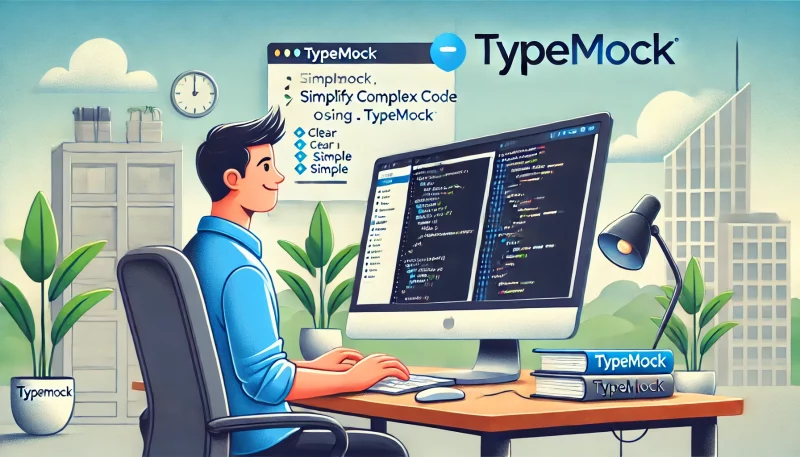Introduction
Are you tired of struggling with complex dependencies and brittle code in your .NET projects? Typemock Isolator is the ideal solution to simplify complex .NET codebases. By using mocking techniques, Typemock Isolator helps developers streamline unit testing, ensuring easier management of complex dependencies. By leveraging powerful mocking features like chained WhenCalleds and default recursive fakes, you can make testing more efficient and reliable. In this article, we’ll explore how to simplify complex .NET code with Typemock Isolator, improve test readability, and reduce maintenance.
Problem Overview
Complex dependencies in .NET projects can make unit testing challenging. Imagine you have a class that interacts with multiple services, each relying on further nested objects. Manually creating fakes or mocks for every dependency and mocking each dependency can quickly become a maintenance nightmare, especially when services call methods deep within other dependencies. Learn how Typemock Isolator can help solve this problem by simplifying the process of creating fakes and mocks in .NET. Mocking with Typemock makes the testing process more efficient by automating the creation of fakes and reducing manual efforts.
The Test Before Using Typemock Features
Before we introduce Typemock’s powerful features, let’s look at how you might write a test in .NET using Typemock without leveraging advanced features such as mocking, chained WhenCalleds, and recursive fakes like chained WhenCalleds and recursive fakes.
|
1 2 3 4 5 6 7 8 9 10 11 12 13 14 15 16 17 18 19 20 21 22 |
[TestMethod] public void ProcessPayment_ValidCredentials_ShouldCompleteTransaction_TypemockBasic() { // Arrange var fakeBankService = Isolate.Fake.Instance<BankService>(); var fakeAuth = Isolate.Fake.Instance<AuthService>(); Isolate.WhenCalled(() => fakeBankService.GetAuthService()).WillReturn(fakeAuth); var fakePaymentProcessor = Isolate.Fake.Instance<PaymentProcessor>(); var fakeTransferService = Isolate.Fake.Instance<TransferService>(); var fakeTransferService = fakeBankService.GetPaymentProcessor().GetTransferService(); Isolate.WhenCalled(() => fakeBankService.GetPaymentProcessor()).WillReturn(fakePaymentProcessor); Isolate.WhenCalled(() => fakePaymentProcessor.GetTransferService()).WillReturn(fakeTransferService); Isolate.WhenCalled(() => fakeTransferService.TransferFunds(0, 0, 0m)).WillReturn(true); // Act var account = new Account(); var result = account.Transfer(fakeTransferService, 100); // Assert Assert.IsTrue(result); } |
Explanation of Typemock Basic Usage
In this Typemock approach:
- We create fakes for
BankService,PaymentProcessor, andTransferServiceusingIsolate.Fake.Instance<T>(). - We set up the behavior for each dependency using
Isolate.WhenCalled().WillReturn(), which includes setting up return values for nested method calls likeGetPaymentProcessor,GetTransferService, andTransferFunds. - While this approach reduces some boilerplate code compared to traditional mocking, it still involves manually setting up each dependency and their interactions.
The Solution: Typemock Isolator’s Chained WhenCalleds
Let’s take a real-world example: You have a class that communicates with a BankService, which in turn depends on a PaymentProcessor, and ultimately a TransferService. The complexity lies in ensuring that the dependencies behave correctly while still allowing you to isolate and test the main logic. Using Typemock Isolator makes the testing process in .NET faster and easier. Typemock’s mocking capabilities help developers isolate code, handle dependencies, and improve testing quality.
Code Example Using Typemock Advanced Features
|
1 2 3 4 5 6 7 8 9 10 11 12 13 14 15 16 |
<code>[TestMethod] public void ProcessPayment_ValidCredentials_ShouldCompleteTransaction() { // Arrange var fakeBankService = Isolate.Fake.Instance<BankService>(); // all calls to this will recursively be fakes Isolate.WhenCalled(() => fakeBankService.GetPaymentProcessor().GetTransferService().TransferFunds(0, 0, 100m)).WillReturn(true); // one line to do everything var fakeTransferService = fakeBankService.GetPaymentProcessor().GetTransferService(); // Act var account = new Account(); var result = account.Transfer(fakeTransferService, 100); // Assert Assert.IsTrue(result); }</code> |
Explanation
In this example, we:
- Use
Isolate.Fake.Instance<BankService>()to automatically create fakes for all nested dependencies ofBankService. This removes the hassle of manually faking each object. - Apply a chained
WhenCalledto set up a default recursive fake forPaymentProcessor,TransferService, and ultimatelyTransferFunds. This keeps the setup readable and lets you focus on the logic rather than managing dependencies. - Create an
Accountinstance and use theTransfermethod, demonstrating a more real-world scenario where the fakeTransferServiceis used in the context of the system under test.
Benefits of Using Typemock Isolator for .NET Testing
- Reduced Boilerplate Code: Default recursive fakes eliminate the need to manually mock each dependency, keeping your tests concise.
- Improved Readability: Chained
WhenCalleds make the test setup more intuitive, allowing you to easily follow the flow of dependencies. - Enhanced Flexibility: You can quickly modify the behavior of individual components without affecting the rest of the setup.
Conclusion
By using Typemock Isolator’s chained WhenCalleds and default recursive fakes, you can drastically simplify complex code, make your tests cleaner, and improve maintainability in your .NET projects. Start leveraging these features today to transform your testing experience and make your .NET code more robust and reliable. With the power of mocking, you can achieve cleaner, more maintainable unit tests.
Conclusion
By using Typemock Isolator’s chained WhenCalleds and default recursive fakes, you can drastically simplify complex code, make your tests cleaner, and improve maintainability. Start leveraging these features today to transform your testing experience and make your .NET code more robust.
Curious about how Typemock can simplify your specific codebase? Download our free trial today and explore how easy it is to mock complex dependencies and improve .NET testing efficiency. Discover how Typemock’s advanced mocking tools can enhance your unit tests and make your development process smoother.




